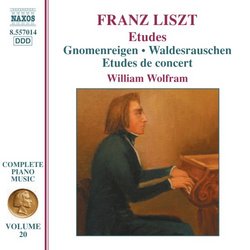| All Artists: Franz Liszt, William Wolfram Title: Liszt: Etudes - Gnomenreigen; Waldesrauschen; Etudes de concert Members Wishing: 0 Total Copies: 0 Label: Naxos Release Date: 4/20/2004 Genre: Classical Styles: Chamber Music, Forms & Genres, Short Forms, Historical Periods, Classical (c.1770-1830), Instruments, Keyboard Number of Discs: 1 SwapaCD Credits: 1 UPC: 747313201426 |
Search - Franz Liszt, William Wolfram :: Liszt: Etudes - Gnomenreigen; Waldesrauschen; Etudes de concert
 | Franz Liszt, William Wolfram Liszt: Etudes - Gnomenreigen; Waldesrauschen; Etudes de concert Genre: Classical
|
Larger Image |
CD Details |
CD ReviewsLiszt's Concert Etude Starter Kit Hexameron | 07/31/2006 (4 out of 5 stars) "Volume 20 in Naxos's Complete Piano Music of Liszt introduces a new pianist, William Wolfram, to the series. Naxos has thus far presented a diverse and excellent group of Lisztian pianists: Arnaldo Cohen, Philip Thomson, Jeno Jando and Konstantin Scherbakov. In my opinion, they have all made substantial contributions to the Liszt discography. Wolfram has gained my respect with his superlative executions of Liszt's concert etudes on this disc. Indeed, I feel that his "Gnomenreigen" and "Un Sospiro" are among the best performances I own on recording. "Gnomenreigen" (Dance of the Gnomes) is a regular pianist's warhorse and I don't think Wolfram's interpretation would displease anyone. He meets the technical demands with ease and masterfully evokes the rhythmic scherzoish and diabolic dancing of gnomes. I'm not afraid to even admit that I prefer Wolfram's Gnomenreigen over Arrau, Bolet and Berman. "Waldesrauschen" (Forest Murmurs) is a different piece altogether that floats through a gentle mist of sound and unexpected whirling octaves. Wolfram proves that he is not only an adept technician, but capable of deeper musicality. The following three concert etudes S144 are typical virtuosic essays from Liszt's early creative period. The first in A flat major, "Il Lamento" is a whopping 9-minute etude with some alien harmonies and interesting passage-work that Wolfram plays with gusto. The second in F minor, "La leggierezza" permeates in the Chopinesque and Wolfram's eloquence does the piece justice. It is Wolfram's execution of the oft-played manifestation of romantic passion, the "Un Sospiro" D flat major etude, that surprised me. Wolfram's handling of the beautiful arpeggios that prelude the sudden crashes (or sighs) in the lower registers are articulated and phrased so well. Wolfram plays this etude as if he had been pining for it; such passion and enthusiasm left me spellbound. The middle bulk of this CD constitutes Liszt's "Etude en douze exercises" that date from 1826(!). These etudes, written in Liszt's youth (he was 13 years old) are historically fascinating since they would eventually evolve into the Transcendental Etudes of 1851. While each etude is rich in music content, they will most likely interest the Liszt aficionado who is intimately familiar with the TE. Essentially, these etudes are short sketches of the themes and ideas that Liszt later transformed. Another remarkable aspect of these early etudes is that some of them were never revived: I detect no groundwork here for the TE No. 6 "Vision" etude or No. 7 "Eroica" or No. 9 "Ricordanza". Thus, many of these early etudes can be considered new music that share no connection with the TE. I only know of one other recording of these early etudes by Leslie Howard, and Wolfram is the better executant, in my opinion. The last virtuoso etudes on this disc are two versions of the "etude de perfectionnement" written for Fetis' "Methode des methodes de piano" of 1840, and another version of "Mazeppa." The two Fetis etudes are almost identical except for an altered and more impassioned ending in the "Ab irato" piece. Indeed, the "Ab irato" is an underrated work that deserves more spots in piano recitals. The best elements of sentimentality and pianistic fireworks shine through: I find the central section just as effective as the passionate moments of "Un Sospiro." The least satisfying part of this disc is an early version of "Mazeppa." Liszt had a propensity to reshape and reframe this music content, which is evident in the fourth TE and his symphonic poem. But this version is merely a curiosity, with altered figurations and extended sections, and does not compare better to the more famous TE. Wolfram also fails to achieve the kind of brio and wild abandon I've heard so many pianists summon. Bottom line: This is another successful recording from the Naxos Liszt series that combines Liszt's popular pieces with lesser known gems. These are worthy etudes given extraordinary readings; in the case of "Un Sospiro," I hold Wolfram's as the highest standard. I also think the "Ab irato" is a neglected gem." Wolfram is the best for Liszt Ludwig's Son | LA | 03/05/2006 (5 out of 5 stars) "I've listened to a lot of Liszt over many years, and William Wolfram plays this repertoire better than anybody. Drama without histrionics, sentiment without sentimentality, an astonishing touch and tone, and technique to burn. The best you can find." Liszt: Etudes A. Johnson | 07/27/2008 (5 out of 5 stars) "The tempos in Ab Irato were slower than others I've heard, but his performance was unique, personal, and musical."
|

 Track Listings (20) - Disc #1
Track Listings (20) - Disc #1